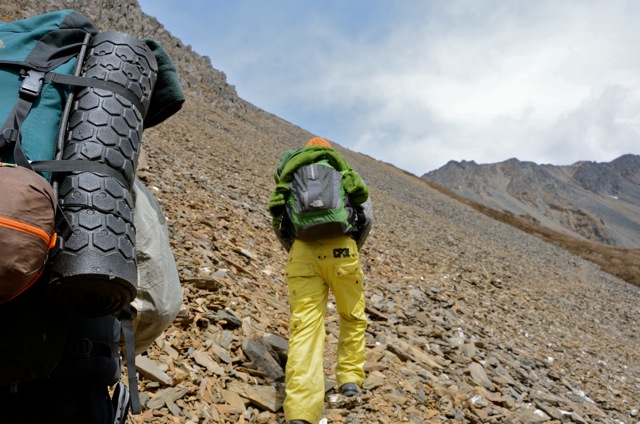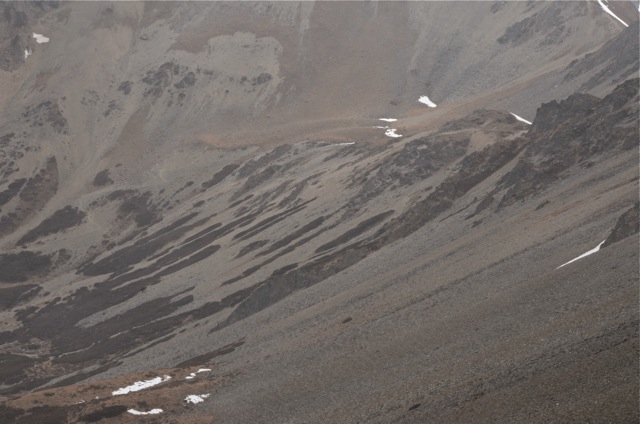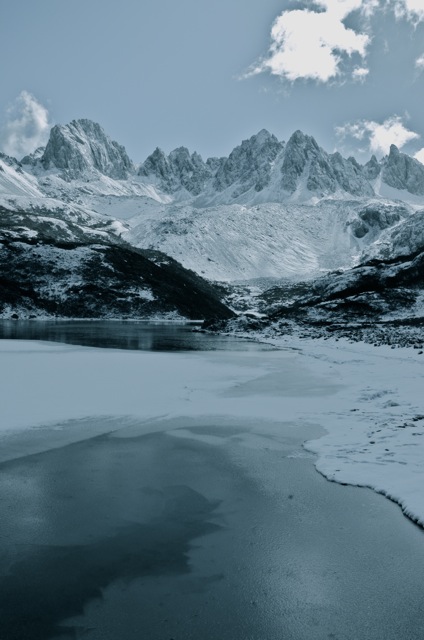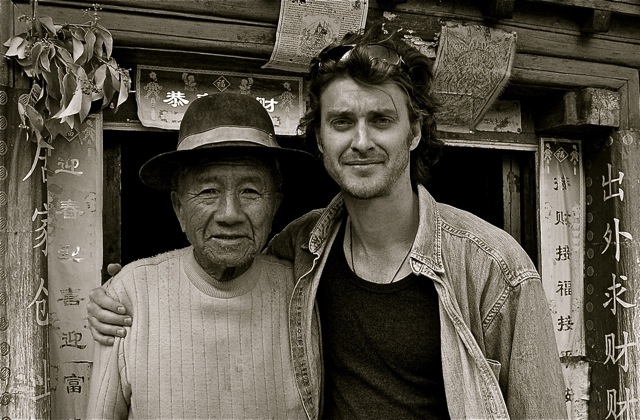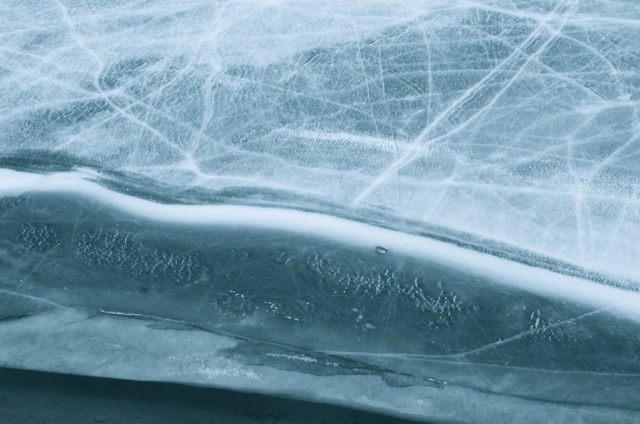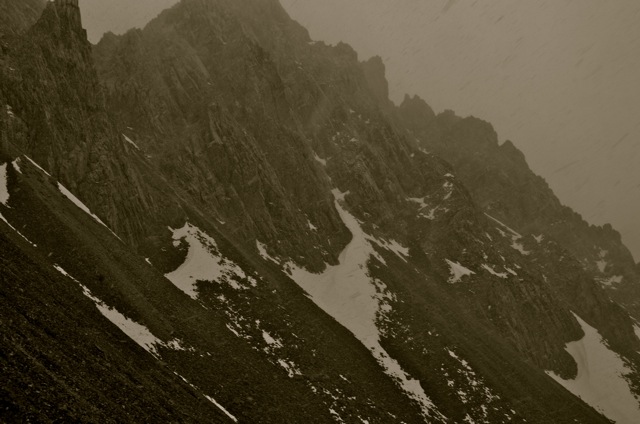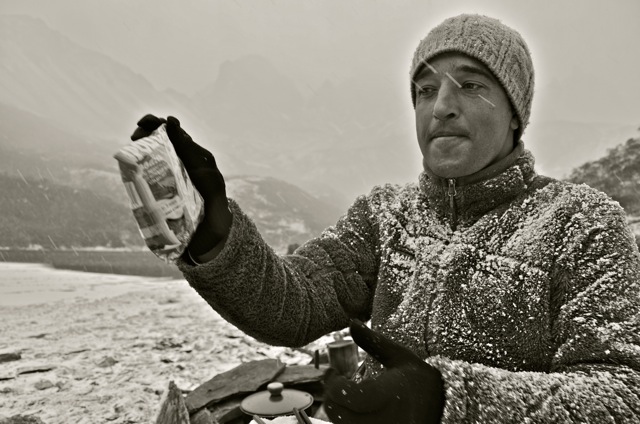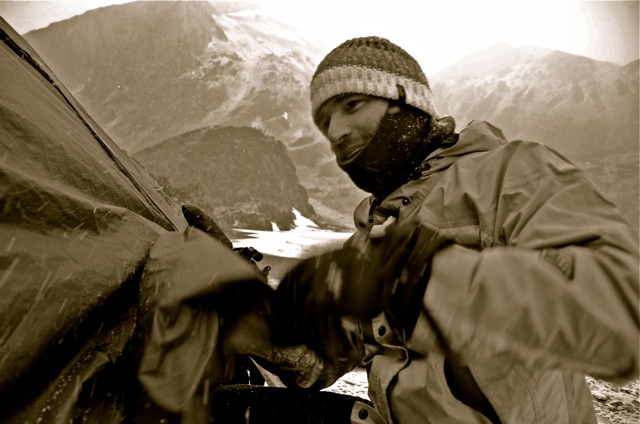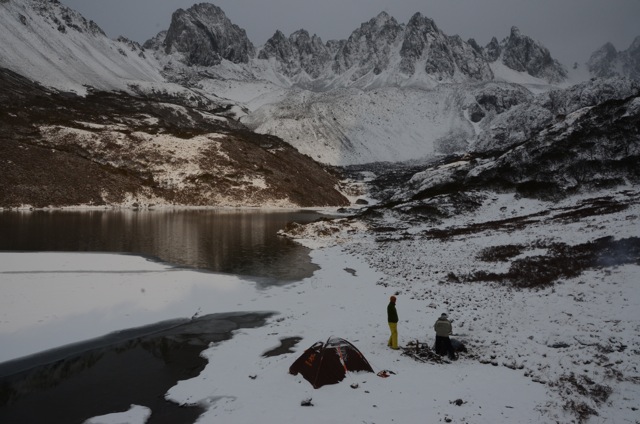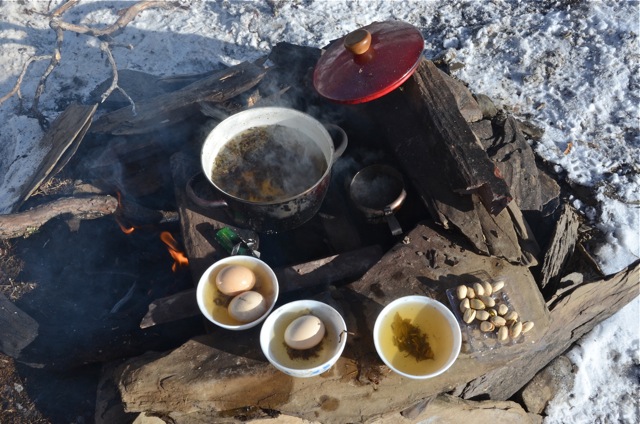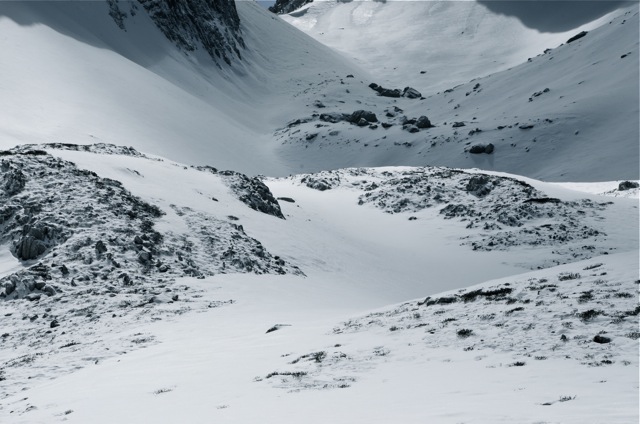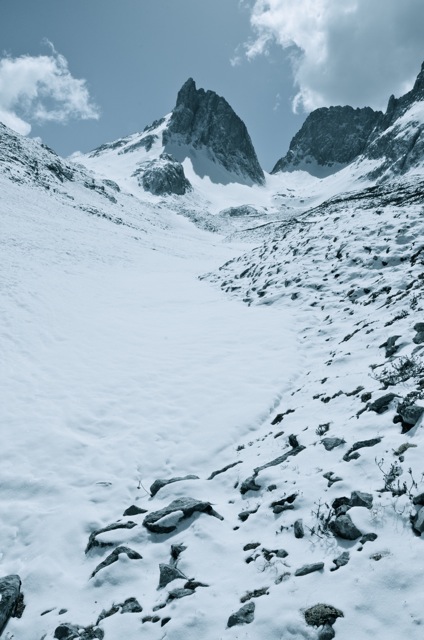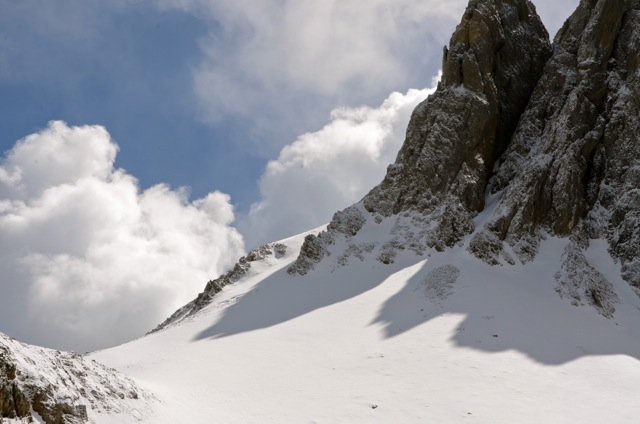It is said amidst the Himalayas that it takes but a whiff of mountain air to know what is coming weather-wise. Neither Fred, Fik, nor I have a nose quite capable of detecting what is to come, though there are cold blasts that barge into the sinuses that I sometimes associate with snow. But, as the winds often do at four thousand metres, there is often a bit of a game that goes on. The winds come, then disappear entirely, only to hit from a different direction moments later with a different kind of scent. Winds blow what they want and in the way they want. They are the marauders of the sky.
Fred’s tanned face grunts once in a while, while Fik steadily treads the shale path beneath us. This shale beneath our feet – and our feet themselves – rest in northwestern Yunnan near my ‘home’. The sky above us says nothing about its intentions and was curiously bland in colour and intensity. Fred’s explosive nature and humour is infectious, unpredictable, and at times without a point.
Fik trots with the odd smile emanating from beneath his huge pack. Our Tibetan friend Yangden has not continued with us, telling us that he “doesn’t like going up, if he doesn’t have to”. We accept this proclamation as he isn’t local and doesn’t know the route. Though I’ve been up in the region before, I’ve never before satisfied myself that I’d actually been far enough; high enough; deep enough. It was such notions that plagued wanderers and climbers of the mountain regions.
Each journey into mounains begins with a vague sense of what might be ‘up there’, and then after the inevitable bit of packing gear, racing to just get there, one has to point oneself ‘up’ and begin to climb. The climb, the breaths, and the limitations are part of the mountain’s welcoming committee.
Fred, an old mate who shared my long love of the cultures and landscapes that made up the Himalayan weave of life, was always up for anything that took him ‘away’. Fik, a good friend of Fred’s was a steady presence who complained about nothing at all while taking in everything. Silences, particularly where geography stunned with both power and subtlety, had been a major portion of our trip. We hadn’t spoken more than a few words on our journey – particularly on the ascent that rose and rose before us offering up new geographies every few metres. Lungs were far more intent on getting enough oxygen into them, than they were in expending efforts to get out words. Another mountain law: eloquence and sweet words rarely had a place in the highlands.
Our destination – in as much as one can have only one destination in the beauty around us – is a sacred lake that is surrounded by peaks. We were but a couple of hours from the flanks of stone that would introduce us to a view of the lake. The peaks that rose on all sides of us were once ushers of a trade path, a caravan route used by travelers and caravans cutting northwest towards the Yunnan border with Tibet. It wasn’t part of the Tea Horse Road, but rather – and more curious to me – one of those strands that only some knew of and used that acted as a feeder to the more major route. More than our destination, it was my idea to climb and explore this lost road as it linked into my eternal hunger for little tid-bits of anything related to the Tea Horse Road. Fred and Fik had happily volunteered to join and add some flavour to the journey up. Even though the efforts kept us silent, the company was welcome and Fred’s repeated commentary of “this better lead somewhere” provided us with some moments of welcome hysteria.
‘Above the lake and through the peaks’, an old trader named Dawa had once told me lay a pass known to the Naxi and Tibetans alike as ‘Gold Pass’. It was in fact this pass that had been for years burning in my head, rather than any peak-summit. Dawa had described it in festive terms, and told of how it led diagonally from the southeast to the northwest.
He had completed my spellbound obsession with words describing the weather within this valley and upon the ‘Gold Pass’. He had spoken of the valley having “its own weather system, which lived a separate life to that outside of its stone walls”. Dawa, sadly having passed, had spoken of many such passes and corridors, that over the years I had, one-by-one, accessed, sought, and struggled over. What made the journeys magic was how even after 50+ years, the elements, aura and feeling of the places, bore stunning resemblance to the old trader’s words. Dawa’s electric language when describing geography was one of the motivators to ‘re-discovering’ the elements of the Tea Horse Road. It was always Dawa’s lined and universal face that veered into my mind on such journeys. Had he been beside us trudging, it would have made the journey spectacularly complete in so many ways. It was up to his words in my memory now, to feed and push the body.
At one point, Fred asks to my back, “Is that the lake”? Turning to him and his thick finger pointing down to a thin strip of solid ice, I shake my head. It is mid-day and we have made good time, though wisps of bizarre cloud formations seem to be streaming above us coming out of the valley.
The ‘lake’ we speak of waits – and as it hopefully always will – rests half coated in ice with lines of striating cracks streaking across its surface. Even Fred, with his years of seeing and taking in some of the most stunning of mountain opulence nods with appreciation. To emphasize his impression he issues one of his famous grunts. Fik stares hard at the lake then smiles, while my eyes peel up and to the right, where the pass should lie. Winds have shorn the skies down into a dark bolt grey and there is a bit of bite now in the air as though we’ve somehow pierced into the sanctum where that weather system that Dawa spoke of so eloquently years ago rested. There are three passes, but one that keeps the watering my eye is a knife-shaped slit resting furthest right. It is nothing but a wedge where the blue light of the sky pokes through.
Seeing it now, it pulls me like a hot meal towards it. “Tomorrow”, I tell it, “tomorrow, I will come to you”.
Snow has so many faces, but of all of its different ‘feels’ it is the driving mountain snow which delivers what it promises.
Afternoon brings a treat of white from above. Winds drive plastic pellets of snow down in horizontal lines. We have our tent up before the onslaught begins and each of us has wandered into different zones of the valley when it hits. Looking up from my perch higher up on the valley wall it feels as if this weather exists only in the valley. Patches of white have gathered in minutes and it is time to head back to the camp. Visibility has dropped and all has taken on a blizzard like grey colour. The pulse races with the suddenness of all.
Camp has shrunken with the white onslaught. Our tent has white guilded edges that expand in front of the eyes, the earth and lake are white, and Fred is cooking noodles within a fire shelter of slate rocks. Fik has carefully placed our packs and essentials within the tent in a world gone white.
Fred’s noodles come and somehow our spirit has lightened with all of the white. We stand around the fire taking sips of the inevitable bottle of Tibetan barley whisky I have tucked away. Temperatures plunge, snow eases and in a twenty-minute span the world around us has silenced and pin prick stars appear above.
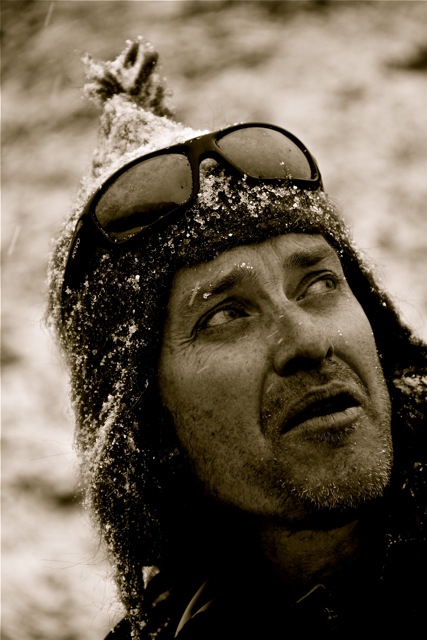
Me responding with a “what” to Fred’s query of “what can possibly be better than noodles for dinner”?
Sleep comes for one of us quickly while two suffer the irreversible effects of deeply embedded cold toes and fingers. Once the cold has permeated the nerves, it is hard to reverse. Fred mutters the odd expletive before slumping into an uneasy sleep.
The three of us manage to stay out of eachother’s bad books even though we are jammed into our little tent practically embracing for the night. My first sense that morning has arrived is a sensation that the entire east side of our little tent is burning with light.
First tentative zips of the frozen zipper reveal a third different version of our valley. Bolt blue skies above, the white of snow hiding much of the landscape and the lake – just metres from our tent – covered with new ice, and the haunting calls of a crow of some kind. Our inner world of tent-life has frozen as condensation has become ice crystals. My swollen eye-lids gaze towards the inevitable pass which seems to hover.
Breakfast consists of stewed tea that is nicely pulverizing, boiled eggs, and a little treat of pistachios. The morning sun massages its way into the bones and before long we have stripped down into minimalist layers unwilling to leave our fire and the brief comforts of camp.
Weather holds and the day to ascend to the pass is set. I will head southwest to it from camp while Fik and Fred will explore the basin and lake area. Sun at these altitudes deceives as rays blast downward and pummel all things with impunity. It is 85 degrees Fahrenheit and only the deepest snows and most solid ice pods remain intact. Rivulets of melt water run deep under my feet, making small sounds. What stuns after an hour of slow ascent is how no life seems to stir.
No traces of life at all. No tracks, no wandering bird forms soaring upon the thermals, no yak traces….but it is perhaps my simple human brain which marvels at this lack of life. My instincts on the other hand feel that this somehow is why it is perfect.
Snow’s deft touches and hard edges have taken an incredible space and made it more beautiful. Winds somehow have restrained themselves and the ascent, which is simply a slog through heat and snow, seems an utterly integral experience.
As always I have this little film running in my head, with the grunts (not of Fred) of the mules and caravans making their way through these hallucinogenic spaces lugging goods wrapped in leathers and skins upon their backs. Before me lie the clean lines of blue and white, but in my head I see and hear a line of mules and men pushing onwards.
Reaching the pass and stamping out a little ‘rug’ of flattened snow, I sit between two informal ‘gates’ of stone sucking in air and life and wondering neurotically if there were perhaps tea-laden mules who rested here.
Later in the day, having left the isolated white of the pass, the weather transforms the world again. The sun disappears, and an ugly stain of clouds positions itself above our camp, which has been dissembled.
Fred is humming away and Fik’s eyes keep looking skyward. The pass gets a last good stare from me, while Dawa’s old face comes back to mind. A last sip of nuclear tea, and we’re all off.


